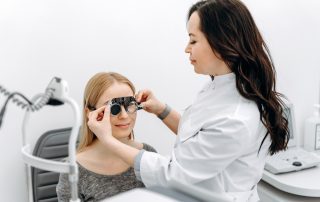Resources
What Is Blue Light?
Several of us in the Ottawa region (even those who already worked consistently at a computer) are now being subjected to even more blue light. Even kids are now exposed to larger amounts of blue light. School was once taught in person, but for some, will still be online this fall. Physical books are quickly being replaced by tablets. Playing
How Do Screens Affect Your Vision
During the past year, all of North America increased their amount of time online and therefore, in front of a screen. Here in the Ottawa region many of us, including our kids, doubled, even tripled time spent in front of a computer or TV. This article will explore how screens affect your vision as well as offer solutions for the
Here Are Good Habits To Protect Your Vision
It’s true; many people don’t start worrying about their eye health, until there’s a problem. Unfortunately, it can be very easy to take our vision for granted. The fact that you’re taking the time to learn about good habits to protect your vision, is a good sign though. Even with some of the most common eye conditions, such as Macular
What You Should Know About Eye Floaters
You’ve probably experienced “eye floaters” before; those dark squiggly lines in your field of vision. Everybody gets them, usually while looking out the window on a sunny day, or while working on a computer. This article will explore everything there is to know about eye floaters, including why you’re seeing them, and if you need to worry. WHAT IS AN
What Can Cause Eye Twitching?
Eye twitching may be common, but it didn’t make the list for the Top 5 Most Common Eye Conditions, mostly because it’s not very serious. “Blepharospasm”. It’s as difficult to say as it is to stop. Blepharospasm is the technical term for an eye twitch. Usually when we have an eye twitch or eyelid spasm, it’s not something we
Here Are Some Tips To Prevent Digital Eye Strain
In the past year, our screen usage increased exponentially. Prior to COVID-19, many people worked in front of a computer all day, but had relief during meetings when we’d sit and talk face to face. The kids used to learn from a teacher in the classroom, but now have to follow along online. Even our social lives are digital.




